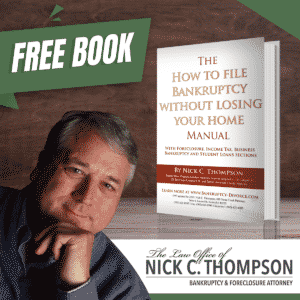Sometimes a debtor files a Chapter 13 bankruptcy. Then, meets all the payment requirements for Chapter 13. However, at the end of Chapter 13, they still get hit with mortgage foreclosure. Why? The lender might claim they are thousands of dollars behind because of the accrual of late fees during the bankruptcy. Or, it might be that property taxes and insurance were not paid.
Often debtors fail to put language into their plan that prevents foreclosure at the end of the case. How could someone file for bankruptcy and still face foreclosure?
 What to do When Home Foreclosure Happens after Chapter 13 Bankruptcy
What to do When Home Foreclosure Happens after Chapter 13 Bankruptcy
⎆ Allowed late fees in Chapter 13 foreclosure.
Do you know that some mortgage companies attempt to charge late fees for every month that the debtor is in Chapter 13 bankruptcy? However, this is only allowable if the judge dismisses the case. But, it is not allowable after a discharge.
The only allowable charges from mortgage companies are in the events of dismissal of Chapter 13, it is withdrawn, or converted to Chapter 7. However, they are cannot charge penalties if the debtor completes their Chapter 13 plan. If a mortgage company charges fees to a debtor after the discharge, the debtor can seek a reversal of the charges—often with the ability to recover attorney fees.
⎆ Interest rate increases from an adjustable rate mortgage (ARM) in Chapter 13 foreclosure.
If the interest rate increases during Chapter 13, and the debtor’s mortgage is an adjustable-rate mortgage (ARM), unfortunately, the debtor might fall behind. Additionally, if the mortgage company did not report the increase, it could leave the debtor with a foreclosure and mortgage delinquency at the end of Chapter 13. However, the debtor or bankruptcy attorney might be able to negotiate to abate the increase. Also, please be aware that much of this is preventable if the debtor places proper language in the plan.
⎆ Escrow payments for insurance and taxes in Chapter 13 foreclosure.
While the debtor is in Chapter 13, they must pay their escrow payments for insurance and taxes on time. The bankruptcy court must receive reports of changes in the amount of money a debtor needs to pay for insurance and taxes. When this doesn’t happen, and the mortgage company pays the charges on the debtor’s behalf, the debtor gets a large bill at the end of their Chapter 13 bankruptcy case. However, this type of mortgage snafu is also resolvable by your bankruptcy attorney.
The way to ensure against foreclosure after your filing is to include language in the plan to prevent such problems. Therefore, you must ensure your budget includes the necessary expenses to avoid finding yourself in foreclosure at the end of your case. Only a good attorney is able to help you meet this plan language challenge and steer you in the right direction.
 Resources for Bankruptcy
Resources for Bankruptcy
Louisville Kentucky Bankruptcy Forms
Property Tax Foreclosure Bankruptcy
List of Debtor Duties for Chapter 13 in Louisville Kentucky
How to Avoid Louisville Foreclosure Scams
Are you facing foreclosure? Then, you are in the right place. Contact my office right away to start the conversation. Nick C. Thompson, Attorney: 502-625-0905

 What to do When Home Foreclosure Happens after Chapter 13 Bankruptcy
What to do When Home Foreclosure Happens after Chapter 13 Bankruptcy

